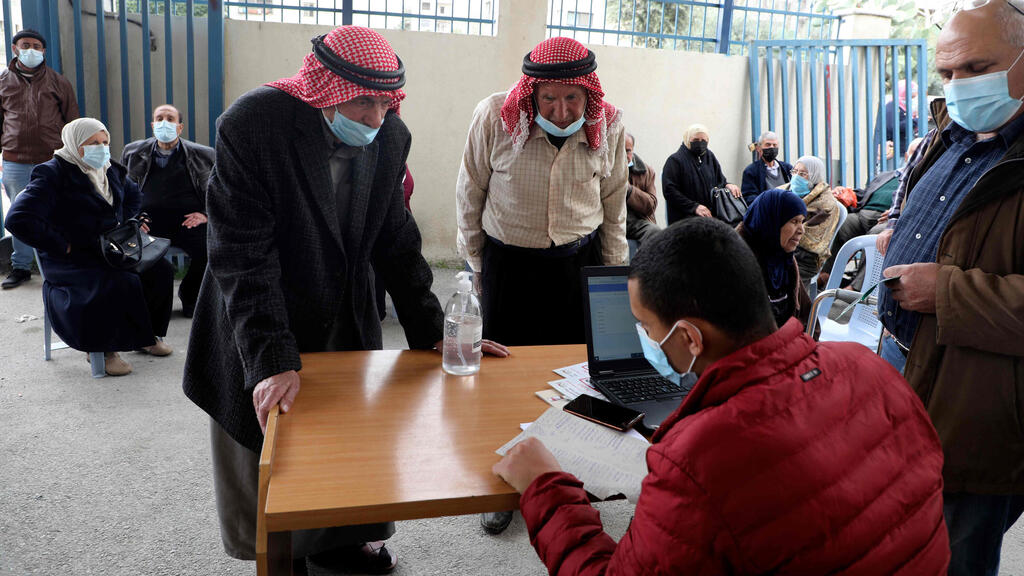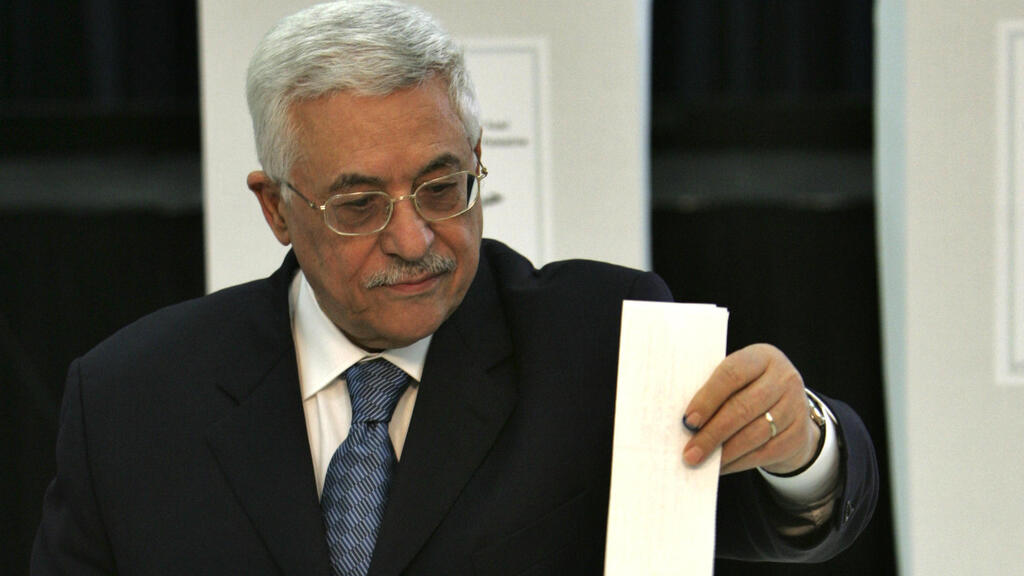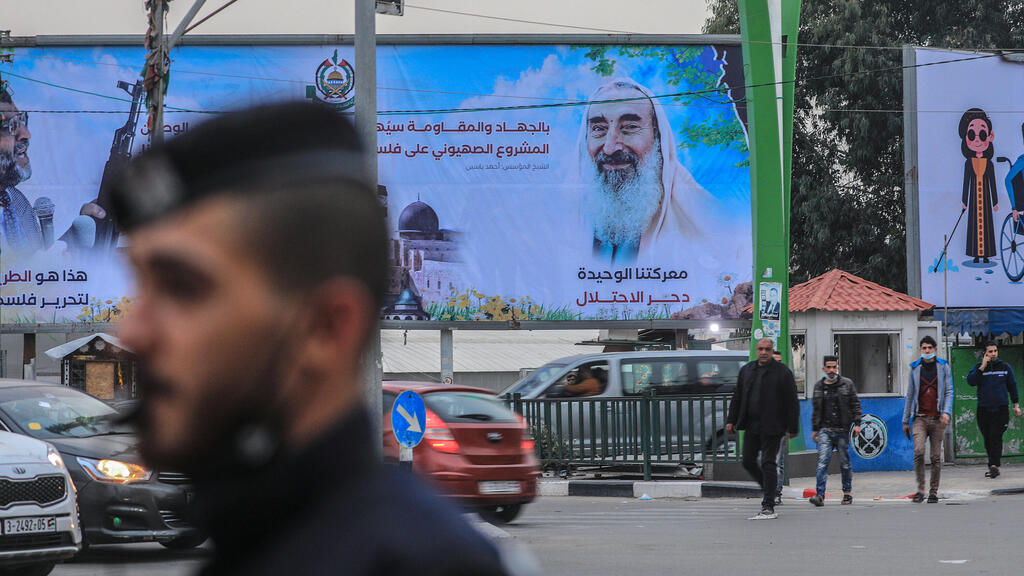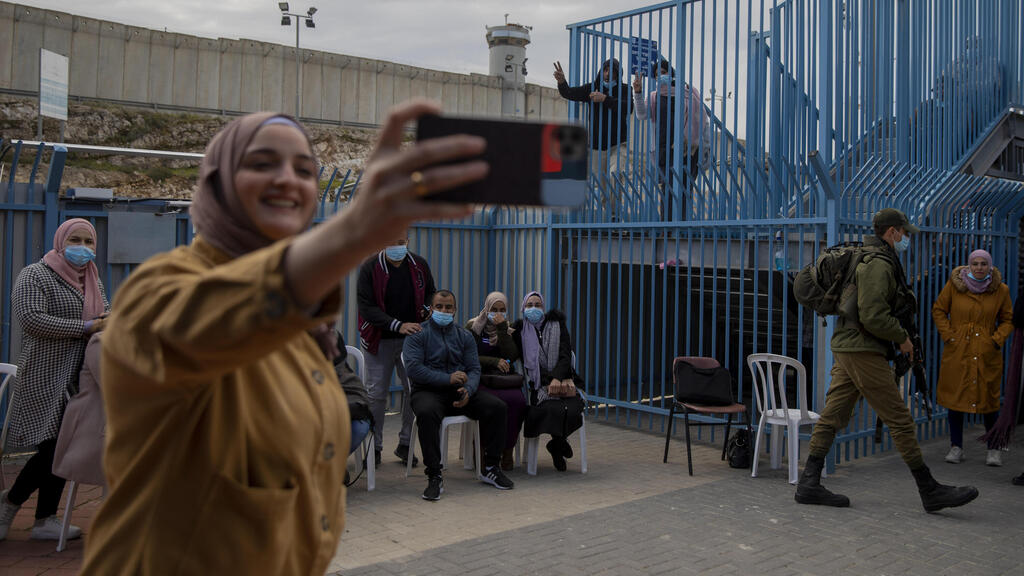Getting your Trinity Audio player ready...
As weary Israelis count votes from its fourth election in two years, Palestinians are beginning to prepare for their first polls in 15 years, juggling both hope and despair.
For surveyor 23-year-old Abdulhameed Mwas the upcoming parliamentary and presidential polls will be the first time he has ever had a chance to vote.
4 View gallery


Palestinians register to get their shot of the Covid-19 coronavirus vaccine in the West Bank city of Nablus
(Photo: AFP)
"We need new faces," he said. "We want to see some results for the Palestinian cause."
As Mwas waited for lunch in a felafel restaurant in the small village of Al-Walaja, he added he hoped a new leadership would work to improve the economic situation in the impoverished Palestinian territories.
The hamlet of stone homes and narrow roads is built on a hillside lying partly in East Jerusalem and partly in the West Bank. It is surrounded by Israel's separation barrier, which splits it from farming land and a nearby spring.
Mwas's colleague, Muayed Odeh, 22, was less upbeat, saying said he had no faith in the upcoming vote. "There is no point," he said.
The army frequently blocked the village's sole entrance, making it feel like "a cage," he said. A new parliament would accomplish "absolutely nothing" to improve the situation.
Uniting Palestinians
Palestinian president Mahmoud Abbas declared in January that parliamentary elections will be held on May 22, followed by historic presidential polls in late July.
4 View gallery


Palestinian President Mahmoud Abbas, casts his ballot in the last Palestinian Parliamentary elections at his headquarters in the West Bank town of Ramallah
(Photo: AP)
"We are looking forward for our own elections to renew the legitimacy of the Palestinian political regime," Jibril Rajoub, a senior official in Abbas's Fatah faction said.
He voiced hopes of uniting Palestinians behind "one clear cut political plan, the emergence of a Palestinian sovereign independent state".
The Palestinians broke ties with the U.S. adminstration of former president Donald Trump, who was a key ally of Prime Minister Benjamin Netanyahu. But they are hoping that under President Joe Biden long moribund peace talks with Israel seeking to create a coveted two-state solution may be restarted.
After initial scepticism among Palestinians, a new poll released this week showed some 61 percent of voters expect the parliamentary polls will indeed go ahead.
"Everyone is taking it seriously," pollster Khalil Shikaki of the Palestinian Center for Policy and Survey Research in Ramallah said. "Three months ago the perception was that there would be no elections."
Like any other country
Since then the Fatah party of president Mahmoud Abbas and its rival the Islamist movement Hamas which runs the Gaza Strip have held talks in Egypt to lay the ground rules for the elections.
4 View gallery


Palestinians walk next to a large poster of Hamas late leader Sheikh Ahmad Yassin during the 17th anniversay of his death in the streets of Gaza City
(Photo: AFP)
This has boosted support among the Palestinians for the vote and at least three quarters of those polled have now said they would participate, Shikaki said.
In Gaza City, Abir Massoud, 39, said the elections "give us a feeling that we live in a country like any other country."
Although she said she did not trust the vote would improve the political situation "it's still possible young people will find more work and life opportunities."
The election commission has been set up, voters are being registered and parties began on Saturday to put forward their list of candidates.
The fate of the Palestinians is inextricably linked to the outcome of Tuesday's vote in Israel - in which Netanyahu is hoping his Likud party and right-wing allies have secured enough seats to stay in power. But as the knife-edge vote is counted, he still has not emerged with a clear path to victory.
4 View gallery


Palestinians take a selfie after receiving the coronavirus vaccine from an Israeli medical team at the Qalandia checkpoint between the West Bank and Jerusalem, Feb. 23, 2021
(Photo: AP)
"He's unbeatable. He's really unbeatable," one Israeli said. "I hope that we can at least manage to, I don't know, to give him less power than he does have."
Ines Abdel Razek, advocacy director of the Palestine Institute for Public Diplomacy in Ramallah, said the Palestinian elections were a source of hope after decades of stagnation. "It is the only tool on the table for people to make their voices heard," she said.
Abbas is deeply unpopular and Palestinian voters say their top priorities are unifying the West Bank and Gaza Strip, improving economic conditions, reducing corruption and ending the Israeli blockade on the Gaza Strip in 2007.
Concern remains however that the elections "will not lead to a democratic renewal, but rather to a renewed legitimacy for those already in power," said Abdel Razek.

